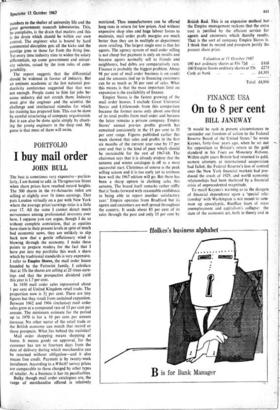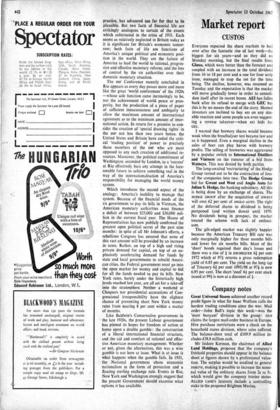On to 8 per cent
FINANCE USA BILL JANEWAY
would be rash in present circumstances to surrender our freedom of action to the Federal Reserve Board of the United States.' So wrote Keynes, forty-four years ago, when be set out his opposition to Britain's return to the gold standard in his Tract on Monetary Reform. Within eight years Britain had returned to gold, earnest attempts at international cooperation had failed, the Federal Reserve's loss of control Over the New York financial markets had pro- duced the crash of 1929, and world economic relationships had been shattered by a financial crisis of unprecedented magnitude.
To recall Keynes's warning as to the dangers of financial dependence upon a 'special rela- tionship' with Washington is not meant to sum-. mon up apocalyptic, Rueffian fears of mass unemployment and capitalism's collapse: the state of the economic art, both in theory and in practice, has advanced too far for that to be plausible. But two facts of financial life are strikingly analogous to certain of the events which culminated in the crisis of 1931. Each seems as relatively neglected in Britain today as it is significant for Britain's economic tomor- row; both facts of life are functions of America's unique political and economic posi- tion in the world. They are the failure of America to lead the world to rational, progres- sive and effective monetary reform; and the loss of control by the us authorities over their domestic monetary situation.
The IMF Conference recently concluded in Rio appears as every day passes more and more like the great 'world conferences' of the 1920s —whose sole function came increasingly to be, not the achievement of world peace or pros- perity, but the production of a piece of paper of sufficient innocuousness and ambiguity to allow the maximum amount of international agreement as to the minimum amount of inter- national action. In return for a promise to con- sider the creation of 'special drawing rights' in the IMF not less than two years hence, the United States and Britain have ceded the criti- cal 'trading position' of power to precisely those members of the IMF who are most opposed to any such creation of additional re- sources. Moreover, the political commitment of Washington, seconded by London, to a 'success' at Rio effectively bars any attempt in the fore- seeable future to achieve something real in the way of the internationalisation of America's responsibility for managing the world money system.
Which introduces the second aspect of the analogy: America's inability to manage that system. Because of the financial needs of the us governtnent to pay its bills in Vietnam, the American monetary authorities must finance a deficit of between $25,000 and $30,000 mil- lion in the current fiscal year. The House of Representatives has now publicly confirmed the greatest open political secret of the past nine months : in spite of all Mr Johnson's efforts, a rebellious Congress has ensured that none of this vast amount will be provided by an increase in taxes. Rather, on top of a high and rising private demand for capital, on top of an ex- plosively accelerating demand for funds by state and local governments to rebuild Ameri- can cities, the Federal government must go into the open market for money and capital to bid for all the funds needed to pay its bills. New York rates, barely under the historically high levels reached last year, are all set for a take-off into the stratosphere. Neither a weekend at Chequers nor presidential accusations of Con- gressional irresponsibility have the slightest chance of preventing short New York money rates from nearing 8 per cent within a matter of months.
Like Baldwin's Conservative government in the late 1920s, the present Labour government has pinned its hopes for freedom of action at home upon a double gamble: the construction of a liberal international financial structure, and the aid and comfort of rational and effec- tive American monetary management. Whether or not, given the alternatives, this was a wise gamble is not here at issue. What is at issue is what happens when the gamble fails. In 1931, the National government chose economic nationalism in the form of protection and a floating sterling exchange rate. Events in Rio, New York and Washington strongly suggest that the present Government should examine what options it has available.



































 Previous page
Previous page